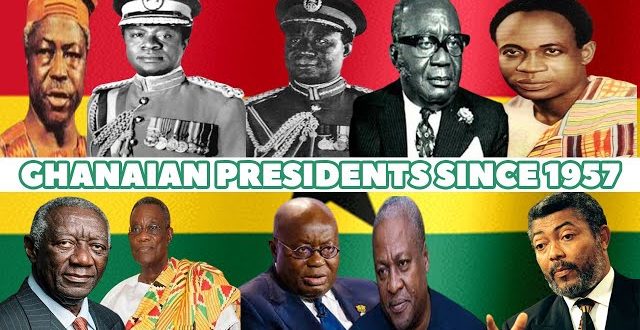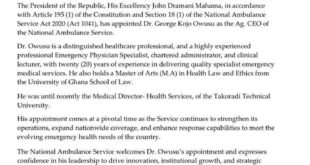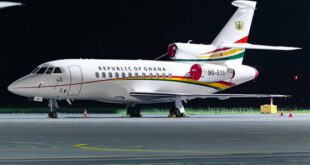Ghana has had twelve presidents including the incumbent president, Nana Akufo Addo since we resorted to democratic system of ruling. Each of them was/is sui generis in the delivery of their constitutional mandate and governance.
They have shown extreme flag-waving and emblazoned the country with smashing and unwonted projects in all spheres. I don’t intend to disparage or deprecate the influences each bestowed upon this country, because human beings are heterogeneously bracketed and for that matter, you might induce unprintable juxtaposition in any case. In as much as, it would be awry and incongruous to balance them, there are few whose work demonstrations and impacts were/are spiffing and in view of it, may needs massive acknowledgement, but not in unctuous way.
Amongst all the twelve presidents, it is evidently clear that, three of them outweighs the remnants based on how they imparted the nation’s development tellingly. These individuals are ; Dr. Kwame Nkrumah, John Agyekum Kufour and the contemporary president, Nana Akufo Addo. Of these three personalities, I herein want to spotlight my line of reasoning on Dr. Kwame Nkrumah and Nana Akufo Addo. John Agyekum Kufour discharged his duties immensely and immaculately, in fact, I do even earmark him as the ‘ father of modern-day infrastructures ‘. In all fairness, he analogously had facile government, for, there was no external disturbance at that time as compared to both Dr. Kwame Nkrumah and Nana Akufo Addo.
The eyebrow of this variance mooted, when the running mate to the NPP flagbearer and also, the Minister of Energy and MP for Manhyia South, Dr. Matthew Opoku Prempeh opined that, Nana Akufo Addo has outperformed Dr. Kwame Nkrumah. As an apostle with academic, historic and partisan political sapience, i want to unmask the straightness entailed in that statement.
To commence, Dr. Kwame Nkrumah was the groundbreaker of Ghana’s independence. His patriotic resilience was atypical and singular. Dr. Kwame Nkrumah has instigated a myriad of social – intervention projects in Ghana. I quite remember, until 1957 the only way to cross the Volta River was by way of ferries. In 1957 the first bridge was built for crossing the Volta by Dr. Kwame Nkrumah.
He started with a development policy dubbed, ‘ the Big Push for Industrialization in Ghana ‘. This policy was to solely equip Ghana with global-standard industries, meaning he wanted Ghana to be the omphalos of industrialism in Africa. Through this ‘ Big Push ‘ enterprise, the Volta River Dam was generated. The Volta River Dam was generally perceived to be a good thing for Ghana and its neighbors. In part, the Dam was more beneficial than anticipated because of the unexpected increased in petroleum prices in the 1970’s. The harbor and port at Tema had also been a boon to Ghana under the same policy. In fact, a lot of prodigious projects have been laid down through that policy.
Dr. Kwame Nkrumah was a socialist and communist president, in Argentina, Juan Peron had the same philosophical leadership style. He was deluded by the rhetorics of socialism and communalism along the line. In effect, the development policy he designed, thus ‘ the big push ‘ begun to be in intractable jeopardy.Some of the more notorious fiascoes of the ‘ Big Push ‘ are listed below;
1) The sugar plant at Asuatuare was built without a water system and remained idle for a year before this flaw was corrected.
2) A tomato and mango canning plant was built at Wenchi (in western Ghana) with a capacity to process 5,000 tons of tomatoes and 7,000 tons of mangoes each year. After it was built at a cost 80 percent above budget and ready to begin operations the authorities discovered there were hardly any mango trees in the area of the plant and it would take seven years for newly planted mango trees to start bearing.
3) There was to be a cattle hide-leather shoe complex. The slaughterhouse was sited in the north at Bolgatanga, a not unreasonable decision since the north is the cattle-raising area of Ghana. However the market for cattle in pre-Nkrumah times were not in the north, probably for good reason. The tannery for turning the hides into leather was sited in the south at Aveyime. The plant in the north could not supply enough hides so the tannery had to import hides. The leather to be produced at Aveyime was to go to a footwear factory in Kumasi in western Ghana. The Kumasi plant was supplied with machinery from Czechoslovakia that could only produce a poor quality product. The footwear was to be shipped to the major consumer market at Accra. After the excessive transporting of the raw materials and final product around the country, the government found the Ghanaian consumers were not willing to buy such a shoddy product. The government then tried to give the boots produced by the plant to the police force. The chief of police pleaded that the boots not be given to the police because they would rebel at having to wear such uncomfortable, poor-quality footwear.
4) Ghana Airways chose Soviet Ilyushin planes which could only be serviced in the Soviet Union. Ghana Airways had to maintain service from North Africa to the Soviet Union to accommodate this servicing requirement. Those lines had hardly accommodate any passengers at all and most of the ones they did were government passengers flying for free.
His administration became involved in magnificent but often ruinous development projects, so that a once-prosperous country became crippled with foreign debt. His government’s Second Development Plan announced in 1959, had to be abandoned in 1961 when the deficit in the balance of payments rose to more than $125 million. Contraction of the economy led to widespread labour unrest and to a general strike in September 1961. From that time, Nkrumah began to evolve a much more rigorous apparatus of political control and to turn increasingly to the communist countries for support. In that process, he brought forth a clueless ideology called ‘ the one-party system ‘. The institution of a one-party totalitarian state and the ruthless persecution of anyone who was less than a devoted worshiper of Nkrumah and even some of those who were. Soon after independence, Nkrumah began restricting political freedoms in Ghana. When regional/ethnic based parties in the northern territories and in Ashantiland presented a political challenge to Nkrumah’s Convention Peoples Party (CPP), he used his party’s overwhelming majority in the legislature to outlaw regional and ethnic-based parties. When this action brought the disparate regional and ethnic parties together into a United Party he then had laws passed that effectively banned all opposition parties. When political activity continued he had the prominent opposition politicians arrested and imprisoned. People who had helped gain independence for Ghana, such as J.B. Danquah, died in prison. J.B. Danquah had invited Nkrumah back to Ghana and made him the general secretary of a political party. With regards to corruption under his tutelage, Government officials took bribes and embezzled state funds. This included Nkrumah himself. He was found to have about $5 million in hidden bank accounts.
On the other hand, Nana Akufo has done a lot for this country, but generally, he hasn’t lived up to the billing. You can’t inculpate him acrimoniously, since his tenure of office had been marred by the hapless emergence of the COVID – 19 and the Russo-Ukrainian War. Honestly, the economy was in its acme until those lugubrious incidences transpired. The economic fallout from Russia’s invasion of Ukraine was another massive setback to the global economy. The toll on Ukraine was immense, but the impact stretches far beyond Ukraine’s borders. The austerity of disruptions in commodity markets and to supply chains weighed heavily on macro-financial stability and growth, adding to an already-complicated policy environment for countries, which were still recovering from the COVID-19 pandemic. Inflation, which had already been rising in many countries as a result of supply-demand imbalances and policy support during the pandemic, was likely to remain higher for longer. Financial conditions had also tightened significantly, putting pressure on a wide range of emerging market and developing economies—through higher borrowing costs and the risk of capital outflows.
The war in Ukraine may contribute to the dangerous divergence between advanced and emerging market and developing economies. More broadly, it risks fragmenting the global economy into geopolitical blocs with distinct technology standards, cross-border payment systems, and reserve currencies. Such a tectonic shift represents the most serious challenge to the rules-based system that has governed international and economic relations for the last 75 years, jeopardizing the gains made over the past several decades. The above statements were captured in the annual report of the International Monetary Fund (IMF) in 2022.
According to the World Health Organization (WHO), as of March 5, 2023, there had been over 759 million confirmed cases of Covid-19 and over 6.8 million deaths globally. World Gross Domestic Product (GDP) was anticipated to decline to 1.7% in 2023, the third slowest rate in nearly three decades, trailing only the global recessions caused by the pandemic and the global financial crisis and Russia-Ukraine war had caused a decline in global growth from 5.7% in 2021 to 2.9% in 2022, with a predicted average 3% slowdown in 2023–2024, besides GDP projected to be at least USD 2.8 trillion lower in 2023. Due to the pandemic, there were notable disruptions in the world’s financial markets with many countries experiencing sharp drops in equity prices and increases in market volatility, increased uncertainty, which has led to increased volatility in financial markets. Financial asset volatility has been felt across various asset classes because of the pandemic, including equities, bonds, currencies, and commodities. Studies found that the uncertainty surrounding the pandemic’s impact has led to increased volatility in currency markets. Two studies claimed that the pandemic led to a sharp increase in volatility in global financial markets, some currencies experiencing significant fluctuations in value, commodity markets, particularly for energy and metal commodities.
Regardless of these mishaps, which have drained the economy, he has been resolutely clutched to the free SHS policy after pumping in a whacking Gh¢ 5.12 billion for the implementation of it between 2017 and 2021. He has done remarkable works as the president: Between 2017 and December 2022, 11,975.96km of roads, 33 bridges, and 6 interchanges were constructed across the country, 1,807km of asphalt overlays, 615km of construction, 1,818km of upgrading, and 6,094km of gravelling and re-gravelling work on unpaved networks. He has completed building the first microhydroelectric plant at Alavanyo in the Volta Region. He has constructed more NCA-licensed fibre optic cable than any other government in the fourth republic (93% of the total); increased the proportion of the population with access to toilet facilities from 33% to 59%; increased the number of public libraries from 61 from independence until 2017 to 115 in 2022;provided more equipment (vehicles, ammunition, etc) to security services than any other government in the Fourth Republic etc.
His projects done are numerous likewise, Dr. Kwame Nkrumah.
The glaring dichotomy between the two, which will let me endorse what Dr. Matthew Opoku Prempeh said is Nana Akufo Addo’s sense of inclusivity, altruism, his corruption-free personality, and open-mindedness. These were the Achilles heel of Dr. Kwame Nkrumah. Also, Nana Akufo Addo encountered the fiercest and nightmarish incidences in the shape of the COVID – 19 and the Russo-Ukrainian War, which the opposition flagbearer, John Mahama even admitted to have impeded the Africa and global economy fluidity, yet still, Nana Akufo Addo has advanced the economy way farther than even surmised in the event of those woes. Lastly, Dr. Kwame Nkrumah without any dubiety inherited prosperous, more enhanced, fruitful economy status and richly – endowed country then unlike Nana Akufo Addo, whose predecessor had liquidated the whole enchilada, from the Natural resources to the human resources. Consequently, the country was in irredeemable economic moribundity and porosity
By: Prof. Emeritus Dinkum.
(The Buzzing Rapine of Erudition)
Email: dinkumchoice@gmail.com
THANK YOU for constantly reading stories on MyGhanaMedia.com, a news publishing website from Ghana. Kindly like, follow, comment, and SHARE stories on all social media platforms for more entertaining updates!
Follow us on Twitter: https://twitter.com/
Source: MyGhanaMedia.com
There are four types of content published on MyGhanaMedia.com daily: curated content; syndicated content; user-generated content; and original content.
 MYGHANAMEDIA.COM Best Source Of Latest News
MYGHANAMEDIA.COM Best Source Of Latest News





